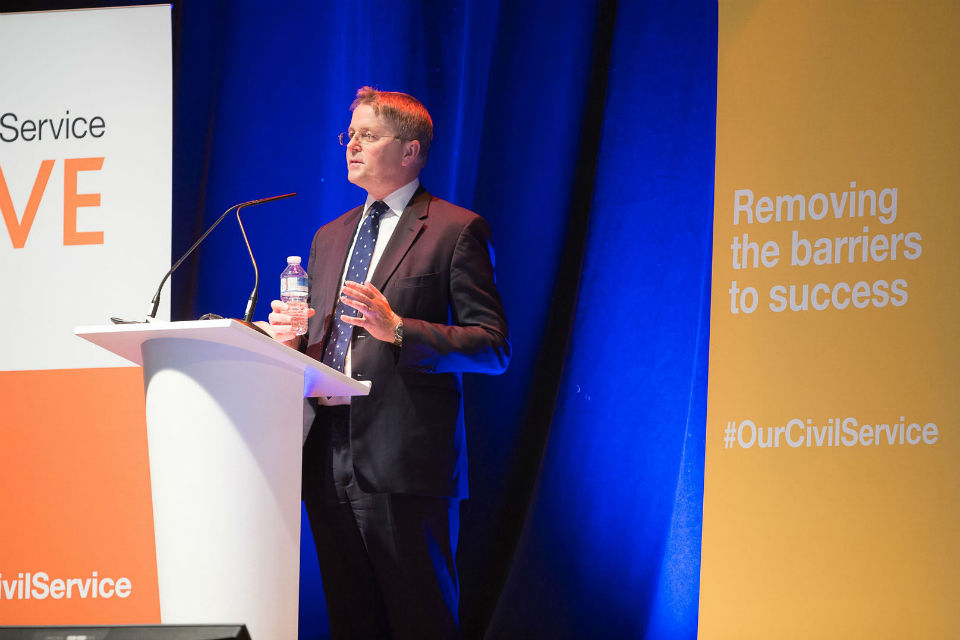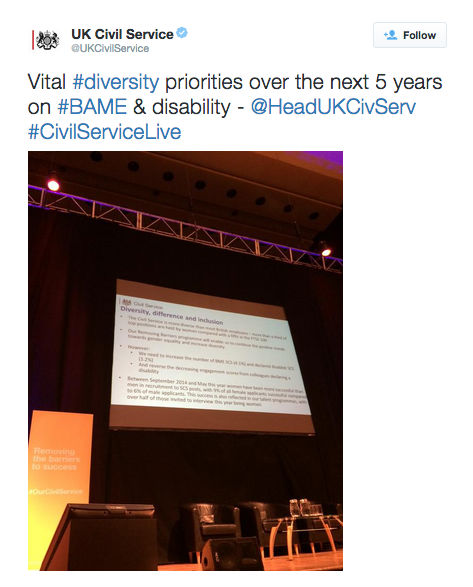
Last week saw the Civil Service celebrate National Inclusion Week. It was the first year that we had taken part and I am delighted that departments and teams across the country participated so enthusiastically and imaginatively.
Some of the highlights included the announcement last Monday of four new independent external diversity advisers to really push the Civil Service to be more inclusive (you can read their blogs here); the publication for the first time on Thursday of each permanent secretary’s tailored diversity objectives and, on Friday, a major session on diversity at the Senior Leadership Group.
Since I became Head of the Civil Service just over a year ago, diversity has been one of my and the Civil Service Board’s top three priorities.

For as long as I am Head of the Civil Service it will remain so. And I know that Matt Hancock, Minister for the Cabinet Office, shares my passion. With the success of National Inclusion Week, it is a good time to look back and assess how much progress we have made.
Our progress so far
My ambition for the Civil Service is for us to be the UK’s most inclusive employer. It must be right that we allow our most talented staff to progress through the organisation, whatever their background. And it must also be right that the Civil Service reflects the society we serve in modern Britain. But, above all, we need to be the best in the UK because it makes good business sense. The Civil Service faces massive challenges as we adapt to the rapidly shifting landscape of policy and public service delivery. We cannot meet these challenges without allowing our best talent to shine.
I am pleased with how much we have achieved over the last year. The original Talent Action Plan (TAP), launched a year ago, was the major first step. Based on independent in-depth research, initially into gender issues, it included important initiatives such as the introduction of shared parental leave and measures to promote flexible working. The majority of its recommendations have now been implemented.
The TAP was refreshed in March this year following similarly comprehensive and independent research into issues facing BAME, disabled and LGB&T staff. Implementation of these further recommendations is also well under way and includes extended and expanded talent schemes, major improvements in data collection to assess progress, measures to tackle bullying and harassment and the formation of a single Diversity & Inclusion unit based in the Cabinet Office to bring together policy and delivery. This unit’s work now encompasses efforts to improve our record on social mobility.
We have more to do
This is, however, only the start. We have much more to do to achieve our objective. But we now have a solid foundation in place based on independent and thorough qualitative and quantitative evidence. We have senior level support at both Ministerial and official level including five permanent secretary champions, superbly led by Sue Owen, driving change in their particular areas of focus. Our staff networks do a fantastic job of championing the needs of individual groups and holding our leaders to account. Our new external advisers, through their experience and expertise, will challenge us to go further. Our data collection and analysis is being transformed so that we can truly assess how much real progress we are making.
I believe that what we have already done gives us the springboard to become one of the UK’s most diverse employers. But to become the best we need to go up another level. We need to ensure that the changes in policy are accompanied by changes in culture throughout the Civil Service. And that means all of us looking at what we can do to make ourselves and the teams we work in more inclusive, so that we are not simply ticking the “diversity” box but are actually becoming an organisation that genuinely values difference not conformity.
So, this is an opportunity for the Civil Service through its unique position in society to build and leave a lasting legacy. Each of you can play your part, without waiting to be asked to by your line managers. Keep a look out for more information and news stories - and talk with your colleagues, line managers and senior leaders to help speed the process of bringing to life our vision and aims to raise business efficiency and create a competitive edge through making the Civil Service the most diverse, inclusive and therefore successful employer in Britain.

7 comments
Comment by Naomi Chambers posted on
As someone who is Indian and English, a true tiny miority and qualified english teacher working in civil service though I progressed outside internally i am still made to feel not worthy or intelligent as the other white lesser talented next grades up. failed at my 121s by false unreal expectations and pressure and my promotion execrcises that my 12 yr students would pass. Diversity for the Managers to do it as a paper exercise with no real show of inclusion is indeed humilating to read that they are working on it, talking about it, feel it is essential yet done nothing to make real changes to talented inspiring people who may be slightly darker than themselves. That is a shame.
Comment by anon posted on
As a middle aged white man, yes the pariah group, i don't find the Civil Service inclusive at all
Comment by A different Terry posted on
Anon- Why? What impediment (s) to your career do you have to overcome that would inform such a disappointing analysis?
Comment by Gavin Thomas posted on
I would have to disagree with the comments of the Anonymous Person above. As A BAME Officer who has been a Civil Servant for much of my working life, the Talent Action Plan is evidence that the Civil Service does take the issue of Diversity seriously and is trying to ensure that the make up of the future Civil Service and at particular at Senior level is far more reflective of modern society. If the Anonymous Person feels that the Talent Action Plan could be improved upon, then perhaps they could join one of the various diversity working groups or feed into the organisation in a more constructive manner, their ideas and suggestions. From my perspective, things are moving in the right direction and there is still much that needs to be done.
Comment by Rossana posted on
It is all very well for senior leaders to comment on diversity and inclusion. However, as a disabled 60 year old woman I have not found the civil service a diverse or inclusive employer. I am at the moment struggling to hold myself together both mentally and physically. I returned to work after an illness that almost cost me my life and left me with a disability that is not always apparent but affects me every day and although my managers are aware of this they seem to be making things more difficult for me. When I have mentioned this to them, they suggest I may be better suited to work elsewhere. I don't know who to turn to.
Comment by Anonymous posted on
You're not fooling anyone. The Talent Action Plan is merely a formal version of some sort of brain storming session people had to discuss diversity - probably thought out by a group of white, middle aged men. It's actually quite insulting.
Comment by Jonathan posted on
It is an insult that an all white group of people make genuine commons on the general publics lively hood and exclude certain members from employment . This is not the diversity we are looking for.